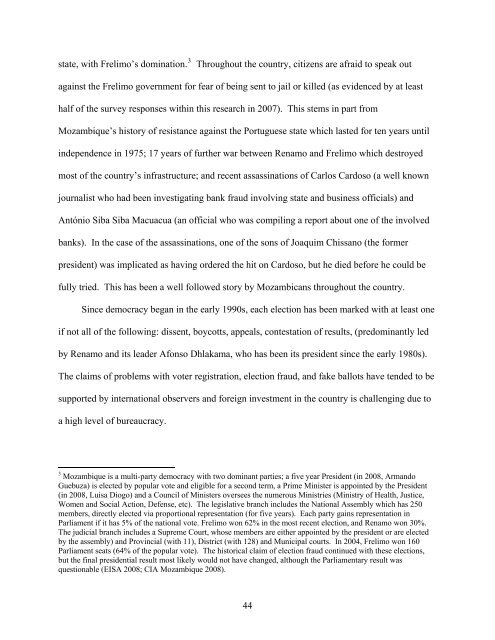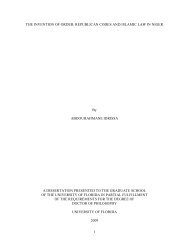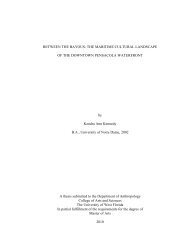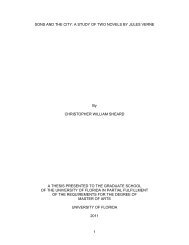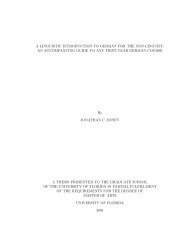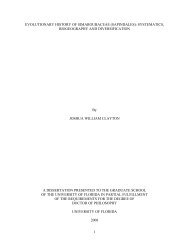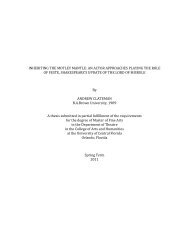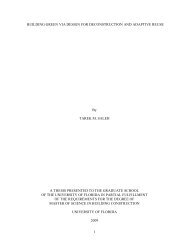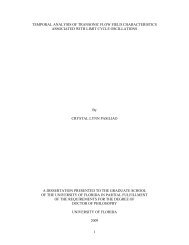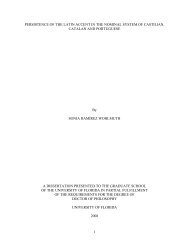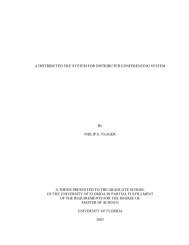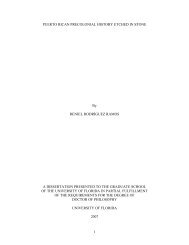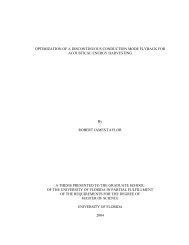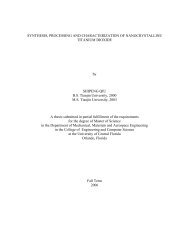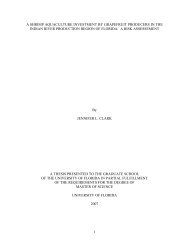- Page 1 and 2: BETWEEN BEDROOMS AND BALLOTS: THE P
- Page 3 and 4: For my mother Mary Jo, the dancer;
- Page 5 and 6: To the Mozambican crew: Julio Antó
- Page 7 and 8: all out every Wednesday and remembe
- Page 9 and 10: TABLE OF CONTENTS ACKNOWLEDGMENTS .
- Page 11 and 12: Reasons for Inactivity.............
- Page 13 and 14: LIST OF TABLES Table page 2-1 Healt
- Page 15 and 16: 7-4 Perceptions of danger in vocali
- Page 17 and 18: LIST OF ABBREVIATIONS ABC Ahitipalu
- Page 19 and 20: NAC NACP NIE OHCHR OTM OMM PEPFAR P
- Page 21 and 22: Abstract of Dissertation Presented
- Page 23 and 24: CHAPTER 1 INTRODUCTION Introduction
- Page 25 and 26: poverty as a driving force behind c
- Page 27 and 28: difficulties, yet possibilities, in
- Page 29 and 30: institutions; participation, or lac
- Page 31 and 32: many African countries, the percent
- Page 33 and 34: civic-ness) to human rights mobiliz
- Page 35 and 36: end of the war many still have diff
- Page 37 and 38: chapters contributes in various cap
- Page 39 and 40: with HIV. This occurrence would hav
- Page 41 and 42: CHAPTER 2 THE REALITIES OF HIV/AIDS
- Page 43: years, individuals have cited a fea
- Page 47 and 48: cooperatives, for schools/supplies,
- Page 49 and 50: migrated to South African mines. In
- Page 51 and 52: Education, created violence awarene
- Page 53 and 54: Guebuza’s business interests (par
- Page 55 and 56: The highest infection rates are fou
- Page 57 and 58: Figure 2-4. Transportation routes i
- Page 59 and 60: Since 1994, over 400 health centers
- Page 61 and 62: By the end of 2002, 1000 HIV+ pregn
- Page 63 and 64: public sector. Overall, however, a
- Page 65 and 66: Sanitation, Food and Water Three-qu
- Page 67 and 68: On paper, the new standards for hum
- Page 69 and 70: and malaria, and in 2005 constitute
- Page 71 and 72: on existing services within the cou
- Page 73 and 74: Table 2-2. ARV distribution sites a
- Page 75 and 76: transforming subjects into citizens
- Page 77 and 78: and shame-inducing or, more broadly
- Page 79 and 80: difference between ‘rights in peo
- Page 81 and 82: of several ways to bring in adheren
- Page 83 and 84: emerged when individuals had varyin
- Page 85 and 86: divine right, then the exclusion of
- Page 87 and 88: ecause the realms often overlap, mu
- Page 89 and 90: …the ‘services’ one sought co
- Page 91 and 92: Contemporary State-Society Relation
- Page 93 and 94: associational life); (Harbeson, Rot
- Page 95 and 96:
and organizations (particularly in
- Page 97 and 98:
(Templeman 1999) Herbst (1990) also
- Page 99 and 100:
voice in the means of state engagem
- Page 101 and 102:
in two ways: by lobbying the state
- Page 103 and 104:
feminist theorists that it must not
- Page 105 and 106:
associations that have mobilized fo
- Page 107 and 108:
domain. Specific research questions
- Page 109 and 110:
Guiding this inquiry is the indepen
- Page 111 and 112:
in Maputo and Boane (in the south o
- Page 113 and 114:
that not all HIV mobilizers are HIV
- Page 115 and 116:
Research Sites, Subjects and Assist
- Page 117 and 118:
The population in the District of C
- Page 119 and 120:
marked with an asterisk* in the fol
- Page 121 and 122:
For surveys, I trained five researc
- Page 123 and 124:
Finally, it needs to be highlighted
- Page 125 and 126:
other half, either we didn’t have
- Page 127 and 128:
Table 4-2. Continued Name of associ
- Page 129 and 130:
Table 4-3. Hospital comparison Hosp
- Page 131:
Some of the groundbreaking institut
- Page 134 and 135:
While in Europe daughters received
- Page 136 and 137:
and patriarchy now continues an une
- Page 138 and 139:
significant obstacle to this was th
- Page 140 and 141:
can function only with the cooperat
- Page 142 and 143:
through individual, personal exchan
- Page 144 and 145:
elations; (Bratton 1989) women who
- Page 146 and 147:
depending on the dominant language
- Page 148 and 149:
While some define traditional autho
- Page 150 and 151:
efficiency and to regulate action.
- Page 152 and 153:
Due to the disengagement from the s
- Page 154 and 155:
individuals will be more comfortabl
- Page 156 and 157:
were volunteers, but now they recei
- Page 158 and 159:
egarding formalized women’s right
- Page 160 and 161:
to signify a lack of interest on th
- Page 162 and 163:
high, mainly because of food insecu
- Page 164 and 165:
icycle taxis pull up to the first r
- Page 166 and 167:
is his responsibility to resolve a
- Page 168 and 169:
have sex with animals, like monkeys
- Page 170 and 171:
come in from the land, he allows ph
- Page 172 and 173:
higher percentage of women HIV mobi
- Page 174 and 175:
without an in-depth knowledge of wh
- Page 176 and 177:
anging from a lack of discussion to
- Page 178 and 179:
the sporadic use of regulados, the
- Page 180 and 181:
Table 5-3. Decisions about children
- Page 182 and 183:
Table 5-9. Type of mobilizer and at
- Page 184 and 185:
world when the civil war ended in 1
- Page 186 and 187:
low life expectancy, they will exis
- Page 188 and 189:
As we saw within some of the litera
- Page 190 and 191:
the context of a relationship, wher
- Page 192 and 193:
fear of community stigma over the d
- Page 194 and 195:
The low pay of government positions
- Page 196 and 197:
Often the régulos will organize cu
- Page 198 and 199:
More importantly, however, an empha
- Page 200 and 201:
each of the regions claimed to mobi
- Page 202 and 203:
Reasons for Inactivity Non-mobilize
- Page 204 and 205:
afraid to attend the hospital to re
- Page 206 and 207:
As briefly mentioned in the last ch
- Page 208 and 209:
still varying but lower (71%). 40 T
- Page 210 and 211:
the only significance is that human
- Page 212 and 213:
is difficult to establish, yet prev
- Page 214 and 215:
Location is important here as most
- Page 216 and 217:
than individual economic or job rel
- Page 218 and 219:
Most view it as public (public topi
- Page 220 and 221:
in the economy of affection to sust
- Page 222 and 223:
Table 6-3. Financial incentive and
- Page 224 and 225:
Table 6-7 Scale of ‘community inc
- Page 226 and 227:
Table 6-11. Scale of Trust of commu
- Page 228 and 229:
Table 6-18. Preference in discussio
- Page 230 and 231:
Table 6-21. Scale of activities in
- Page 232 and 233:
Table 6-27. HIV and human rights mo
- Page 234 and 235:
understand the “publicity of repr
- Page 236 and 237:
appeals to a sense of community, an
- Page 238 and 239:
such was the intention of the actor
- Page 240 and 241:
Additionally, advocacy also involve
- Page 242 and 243:
its own coordinator but there is li
- Page 244 and 245:
song praising Rensida: “We are ha
- Page 246 and 247:
Father: Quiet my daughter because w
- Page 248 and 249:
various areas of the offices; some
- Page 250 and 251:
audience members take turns dancing
- Page 252 and 253:
protests or marches, but in reality
- Page 254 and 255:
Corruption in the Health Sector A F
- Page 256 and 257:
Although AIDS drugs are free within
- Page 258 and 259:
activists are less advocacy-oriente
- Page 260 and 261:
December 2006) The roles of these o
- Page 262 and 263:
as human rights mobilizers) perceiv
- Page 264 and 265:
individuals simply see the AIDS dom
- Page 266 and 267:
Macuta, 4 April, president of Kulup
- Page 268 and 269:
in turn doesn’t say anything abou
- Page 270 and 271:
ack. This man says he has one proje
- Page 272 and 273:
others to support a candidate or po
- Page 274 and 275:
government provision of health infr
- Page 276 and 277:
mobilizers are more likely to have
- Page 278 and 279:
education through information disse
- Page 280 and 281:
count hits 250, which is somewhat s
- Page 282 and 283:
Thus, we can reject the null hypoth
- Page 284 and 285:
information transmission within Afr
- Page 286 and 287:
Table 7-3. Perceptions of corruptio
- Page 288 and 289:
Table 7-9. Scale of interest and di
- Page 290 and 291:
Table 7-15. Scale of interest and d
- Page 292 and 293:
Table 7-21. Influence II How much i
- Page 294 and 295:
Table 7-24. Continued Before joinin
- Page 296 and 297:
CHAPTER 8 MOVING FROM SUBJECTS TO C
- Page 298 and 299:
partner’s status) and thus create
- Page 300 and 301:
HIV/AIDS programs because of this i
- Page 302 and 303:
or accessible employment), then lit
- Page 304 and 305:
times a year), also include more im
- Page 306 and 307:
are trying to overcome their oppres
- Page 308 and 309:
Patriarchy Poverty Particular types
- Page 310 and 311:
We might frame this as a way to beg
- Page 312 and 313:
choose or are forced to spin off in
- Page 314 and 315:
subsidies, hence the line is render
- Page 316 and 317:
most resist such change, particular
- Page 318 and 319:
Interdependence and regulation HIV
- Page 320 and 321:
domestic relationships; and allowed
- Page 322 and 323:
Of course, although such outside re
- Page 324 and 325:
include keeping quiet about the dys
- Page 326 and 327:
etween the private and public arena
- Page 328 and 329:
APPENDIX A ASSOCIATION OVERVIEW Ove
- Page 330 and 331:
Working mainly in Maputo (but tryin
- Page 332 and 333:
Ahitipaluxeni: (Shangana for ‘vam
- Page 334 and 335:
Maputo: human rights associations M
- Page 336 and 337:
ased programs only go to HIV based
- Page 338 and 339:
office. It receives no funding from
- Page 340 and 341:
When a domestic problem becomes a s
- Page 342 and 343:
egions of the country. It has organ
- Page 344 and 345:
• feel they have little influence
- Page 346 and 347:
(Education in association) No signi
- Page 348 and 349:
H3: HIV mobilizers partake in more
- Page 350 and 351:
Expectations of donors Expectations
- Page 352 and 353:
After association volunteer with go
- Page 354 and 355:
H8: HIV mobilizers are less likely
- Page 356 and 357:
2005 New Constitution PLWHA qualify
- Page 358 and 359:
We would like to ask you about how
- Page 360 and 361:
Do you or your partner make most of
- Page 362 and 363:
Who is responsible for providing: S
- Page 364 and 365:
A For those in organization I found
- Page 366 and 367:
Do you feel that vocalizing opposit
- Page 368 and 369:
How strongly do you identify with o
- Page 370 and 371:
(For non mobilizers) Questions pert
- Page 373 and 374:
Pitakufa Pito Quadrado Regulado Ré
- Page 375 and 376:
Barcellos, Némora Tregnago. 2005.M
- Page 377 and 378:
Chabal, Patrick and Jean-Pascal Dal
- Page 379 and 380:
Education Action 18. N.D. “Positi
- Page 381 and 382:
Freedom House. 2008. Freedom in the
- Page 383 and 384:
Helmke, Gretchen and Steven Levitsk
- Page 385 and 386:
James, Wendy 1978. “Matrifocus on
- Page 387 and 388:
Mosse, Marcelo. 2004. Corrupção e
- Page 389 and 390:
Patterson, Amy. 2005. The African S
- Page 391 and 392:
Simon, Herbert A. 1982. Models of B
- Page 393 and 394:
UNAIDS. 2008b. “Epidemiological F
- Page 395 and 396:
WHO (with UNAIDS and UNICEF). 2008.


